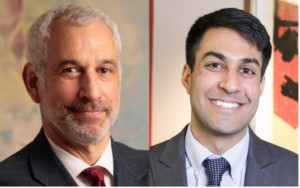 Brown, Goldstein & Levy attorneys Andy Freeman and Neel Lalchandani recently won a victory on behalf of the Virginia Department for the Blind and Vision Impaired (“DBVI”) in a long-running Randolph-Sheppard matter.
Brown, Goldstein & Levy attorneys Andy Freeman and Neel Lalchandani recently won a victory on behalf of the Virginia Department for the Blind and Vision Impaired (“DBVI”) in a long-running Randolph-Sheppard matter.
For 16 years, from 2001 to 2017, DBVI and its blind vendor successfully operated the cafeterias at what was then Fort Lee (now Fort Gregg-Adams) in Virginia. In 2017, the Army wrongfully rejected DBVI’s proposal for continued operation of the contract, erroneously claiming that the bid was outside the “competitive range.” After Andy and Neel forced the Army to re-solicit the contract, in early 2022 the Army again refused to contract with DBVI.
Congress enacted the Randolph-Sheppard Act to provide economic and entrepreneurial opportunities for the blind. In pursuit of these goals, in 1974, Congress required federal agencies to give priority to blind vendors to operate food services and vending facilities on federal property. In the early 2000’s, Brown, Goldstein & Levy won precedent-setting cases affirming that the Randolph-Sheppard priority applies to cafeterias on military bases. The Act has allowed tens of thousands of blind merchants to build successful businesses with hundreds of thousands of employees across the country.
On behalf of DBVI, the Brown, Goldstein & Levy attorneys initiated the Randolph-Sheppard arbitration process. Over the Army’s vigorous opposition, Andy and Neel developed strong evidence that DBVI’s proposal was within the competitive range and should have resulted in an award of the contract. On the eve of the arbitration hearing, the Army agreed to negotiate directly with DBVI and its blind vendor, resulting in a contract very similar to the one DBVI had initially proposed. Since April 1, 2023, blind vendor Jimmy Cunningham and DBVI have been providing high-quality food service to the thousands of soldiers and other personnel at Fort Gregg-Adams.
Brown, Goldstein & Levy has successfully represented blind vendors and State Licensing Agencies under the Randolph-Sheppard Act for over 35 years and continues to do so on a regular basis. Read more about the practice here.